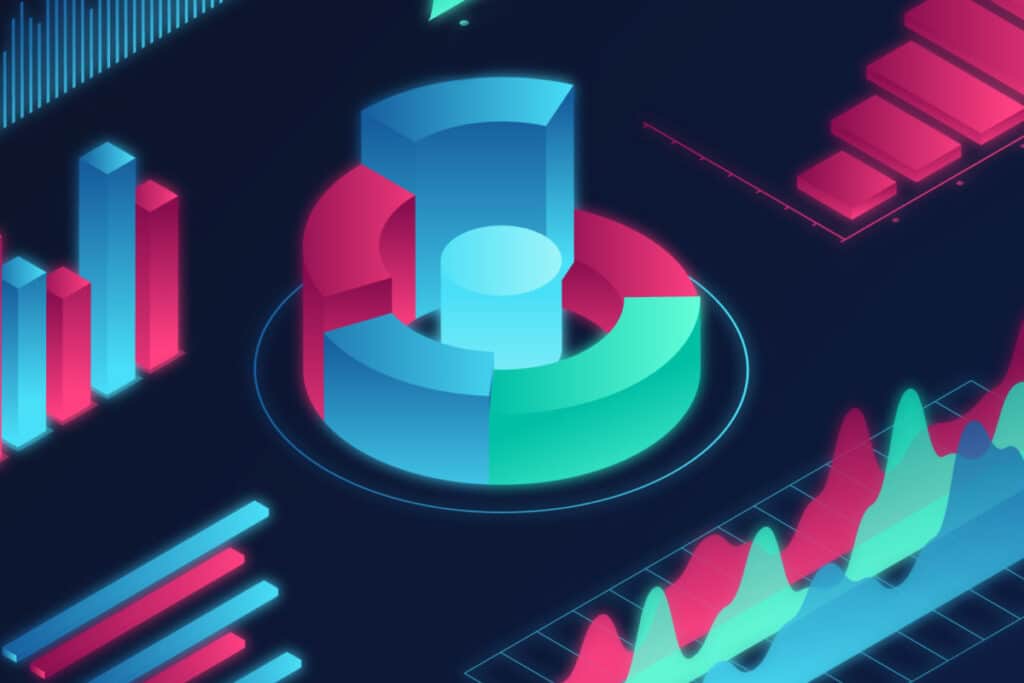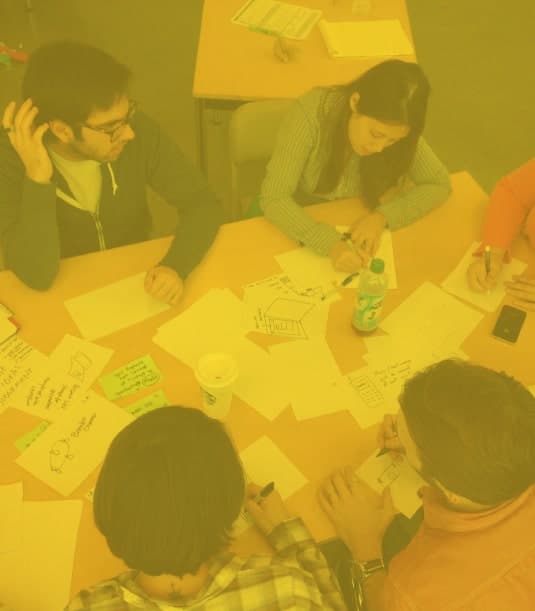Menu

The online M.P.S. in Data Analytics and Visualization program at the Maryland Institute College of Art (MICA) is a 30-credit hour program, designed to be completed in 15 months while working full time. This program teaches professionals how to present information and data in a visual and meaningful way with the use of graphics, images, and dynamic interactive features. View some of our innovative student capstone projects that are making an impact in the world.
Complete your M.P.S. in Data and Visualization in just 15 months with an accelerated, 100% online format. With no set class times, you learn when and where it works for you. Throughout the program, you’ll collaborate with peers and faculty, enabling you to succeed in the online learning environment.
Learn and apply the latest software tools, best practices, and innovative methodologies in data analytics and visualization. Build both the practical skills and confidence as you apply the program to your current role and future career.
Access our comprehensive career development services, develop powerful career advancement strategies, benefit from optional professional skills-based workshops, and learn from professionals with hands-on experience to ensure you advance in your UX career.
At MICA, you belong to a welcoming and supportive community that fuels innovation and professional growth. Our M.P.S. programs equip creatives with the skills, connections, and resources needed to thrive in evolving industries. Industry-leading faculty provide ongoing support through office hours and constructive feedback, ensuring you stay engaged throughout the program.
Learn by doing and engaging in hands-on coursework, case studies, and real-world projects designed to help you immediately apply data visualization and storytelling techniques in your current work. Engaging multimedia course content enhances your learning experience, making it easier to grasp concepts and apply them effectively.
Throughout the program, you’ll create a professional portfolio, culminating in a final capstone project. Applying data visualization techniques to real-world projects builds in-demand skills and prepares you for future career goals.
Adjunct faculty member Carly Sinceri shares how MICA’s flexible online Master of Professional Studies in Data Analytics and Visualization empowers creative professionals to advance their careers without putting their lives on hold.
In almost every industry or sector, data is the foundation of sound decisions. But one must know how to analyze and communicate the data to utilize it. Our courses teach the skills and best practices to analyze and communicate data effectively. They also show how to influence actions, strategies, and solutions through data storytelling.
In addition to the courses detailed below, workshops are offered throughout the program at no additional cost, topics may include:
To ensure student success in the program, students will complete an asynchronous orientation course in Canvas as a means to introduce them to the navigation of MICA’s administrative tools as well as inform them of academic services available through MICA. The content and assignments in the orientation course are designed to be an introduction to the program as well as a resource throughout the students’ time at MICA.
Core Skill & Software Applications: Exploring types of visualizations, contextualizing data visualization in the past and present
Core Skills / Software Applications: Exploring types of visualizations, contextualizing data visualization in the past and present
We live in a world surrounded by ever-increasing amounts of information in the form of data. Converting this raw data into a visual form that communicates effectively involves data analytics and advanced information visualization literacy. You will study the way visualization has been used historically and is being used today in various industries to tell compelling narratives. You will explore perspectives and research from the fields of art/design history, theory, and visual culture.
Core Skills & Software that students may use: : Excel, Tableau, R, Descriptive statistics, Data cleaning, Data visualization in R
Core Skills / Software Applications: Excel, Tableau, R, Descriptive statistics, Data cleaning, Data visualization in R
This course will teach you the methods for gathering, organizing, preparing, and analyzing information and data central to visualization and telling your story. Giving you the means to communicate your big ideas, you will explore tools and software applications that establish descriptive statistical relationships. You will also develop foundational skills needed to transform research into compelling visualizations.
Core Skills : R and R Markdown, Perform more complex data manipulations required to generate visualizations.
Core Skills / Software Applications: R and RMarkdown, Perform more complex data manipulations required to generate visualizations.
The course provides an overview of probability and statistics concepts commonly used in the visualization process. You will learn to apply concepts such as statistical measures, correlation, and regression to data sets. You will continue to use and gain proficiency in tools and softwares introduced in Statistics and Analysis and explore additional methods for data analysis that apply to real-world challenges.
Core Skills :: Adobe Illustrator, Gestalt laws & Universal principles of design
Core Skills / Software Applications: Adobe Illustrator, Gestalt laws & Universal principles of design
This course teaches you how to create impactful information visualizations that will produce results. You will be introduced to the best practices in organizing space, using type and color based on well established guidance.
Core Skills: Storytelling techniques, Human-centered design, Storyboarding/wireframing, Interactive visualizations (Intro to D3), Tableau
Core Skills / Software Applications: Storytelling techniques, Human-centered design, Storyboarding/ wireframing, Interactive visualizations (Intro to D3), Tableau
Building upon Visual Storytelling I, students learn about different forms of storytelling and how techniques such as sequence, relationship, context, and audience can be combined through analysis and design strategies to tell a powerful story. Students continue to engage in the design process and apply principles of human-centered design.
Core Skills: Exploring types of visualizations, contextualizing data visualization in the past and present
As part of your online graduate program, you’ll participate in a 1-credit-hour Industry Immersive course designed to expose you to industry professionals and prepare you for real-world applications in your field. Offered over 8 weeks in an asynchronous format, this course can be completed at your pace within the timeframe the course is open and provides valuable insights and content created by subject matter experts in your specific field.
Through a series of archived workshops and activities, you’ll explore topics which may include:
– Storytelling with data and engaging with the world as a data visualization professional.
– Professional Development: Career advancement strategies, networking techniques, and industry-specific best practices.
This industry immersive course offers a unique opportunity to enhance your expertise, expand your professional network, and gain practical skills directly from leaders in your industry.
Core Skills: Project Management, User testing, Prototyping, Critique, Iteration and applying feedback
Core Skills / Software Applications: Project Management, User testing, Prototyping, Critique, Iteration and applying feedback
This course integrates all the various concepts explored throughout the program and engages MICA’s industry partners to present students with challenges faced by professionals in the Data Analytics and Visualization industry. The goal of this course is to serve as a cornerstone of your portfolio, showcasing end-to-end design thinking. You will engage with the project decision-making process, ethical uses of data and visualizations, project management, budget and risk management, user interface design, and testing. Additionally, you will use visualization applications to help execute business strategy and support communication with a wide variety of stakeholders.
Core Skills: How Data Visualizations are presented through the synthesis of Skills, Softwares, and Methods. Research, Data Collection and Cleaning, Critique, Applying feedback, Iteration.
Core Skills: Exploring types of visualizations, contextualizing data visualization in the past and present
During Capstone I, you will collaborate with your faculty advisor and peers for critique and guidance as you tie together the theories, methodologies, and skills acquired throughout the program. You will work from a real-world concept to a fully realized prototype.
Core Skills: Continued critique, Applying feedback, and Iteration. Project management, Narration creation and Storytelling (prototyping to target audience), Presentation skills.
Core Skills / Software Applications: Continued critique, Applying feedback, and Iteration. Project management, Narration creation and Storytelling (prototyping to target audience), Presentation skills.
You will continue to develop the project started in Capstone I as you work toward the final prototype of your capstone project. You will create a written narrative to accompany your visualizations and consider the most effective ways to present your work during the final virtual capstone presentation.


As part of your online graduate program, you’ll participate in an Industry Immersive course designed to simulate industry challenges and to prepare you for real-world applications in your field. Through a series of industry-relevant workshops and activities created by subject matter experts in your field, you’ll apply theoretical knowledge to real-world projects, exploring topics including:
Storytelling with data and engaging with the world as a data visualization professional.
Career advancement strategies, networking techniques, and industry-specific best practices.
This industry immersive course offers a unique opportunity to enhance your expertise, expand your professional network, and gain practical skills directly from leaders in your industry.
This course is a 1-credit hour course. It is offered over 8 weeks in an asynchronous format and can be completed at your pace within the timeframe the course is open.